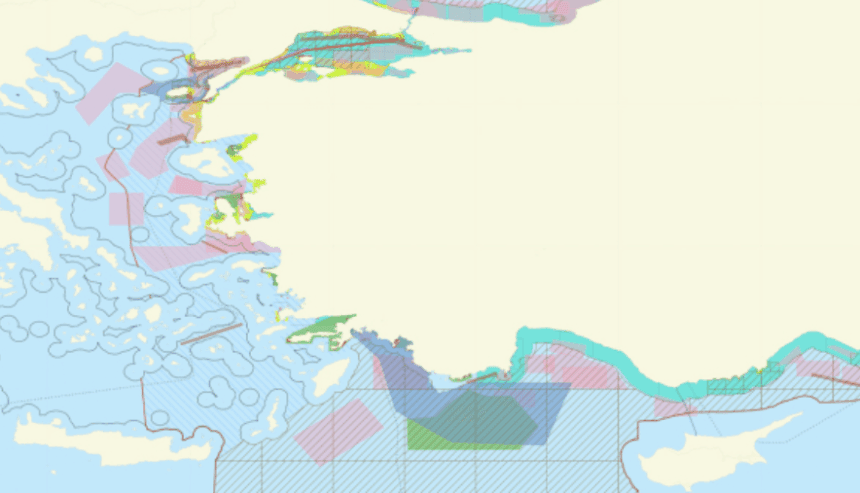Tensions between Greece and Turkey have resurfaced following Ankara’s announcement of two new marine protected areas in the Aegean and Eastern Mediterranean. The Turkish initiative, submitted to UNESCO’s Intergovernmental Oceanographic Commission, comes shortly after Greece declared its own marine parks in the Ionian and southern Aegean Seas.
The Turkish marine spatial planning map, developed by Ankara University’s National Research Center for Maritime Law (DEHUKAM), outlines two distinct zones. The first lies in the Northern Aegean, beyond Turkey’s territorial waters, west of Imbros (Gökçeada) and Tenedos (Bozcaada), extending toward the waters between the Greek islands of Samothraki and Lemnos. The second is in the Eastern Mediterranean, starting northeast of Rhodes and extending to the Gulf of Antalya. The island of Kastellorizo, a longstanding point of contention in Greek-Turkish maritime relations, is notably excluded from the designated area.
Greece has strongly objected to Turkey’s announcement, calling it an “unacceptable, unilateral and illegal action” in an official statement from its Ministry of Foreign Affairs. Greek officials argue that the Turkish marine parks have been declared in undelimited maritime zones and therefore have no legal effect on Greece’s sovereign rights. Athens maintains that such actions undermine the principles of international law, particularly the United Nations Convention on the Law of the Sea (UNCLOS), which Greece has ratified but Turkey has not.
The Turkish government has framed the move as part of a broader environmental and maritime governance effort, aligning with international conservation goals and marine spatial planning practices. Turkish officials have also emphasized their intention to expand marine protection initiatives in other coastal areas.
Observers note that the development reflects the broader strategic context of maritime competition between the two countries. Turkey’s approach is often associated with its “Blue Homeland” (Mavi Vatan) doctrine, which envisions a greater Turkish role in regional maritime affairs. Greece, in contrast, relies on international legal frameworks that recognize island-based maritime entitlements, including for islands such as Kastellorizo.
The Greek government recently announced the establishment of two marine parks—one in the Ionian Sea and another in the southern Aegean—covering a total of 27,500 square kilometers. Greek Prime Minister Kyriakos Mitsotakis described these as among the largest protected marine areas in the Mediterranean. Turkey, at the time, criticized the Greek initiative as a unilateral action, expressing concern that it could impact the broader status quo in the region.
The current developments are part of a long-running disagreement between Athens and Ankara over maritime boundaries, airspace, and sovereignty in the Aegean and Eastern Mediterranean. Both sides continue to assert competing legal and historical claims, with periodic efforts at dialogue often accompanied by diplomatic and symbolic gestures such as these.



